Real Estate Crystal Ball: Leveraging AI for Market Analysis
Written by: Clyde Christian Anderson
Why Real Estate Market Analysis AI is Changing Property Investment
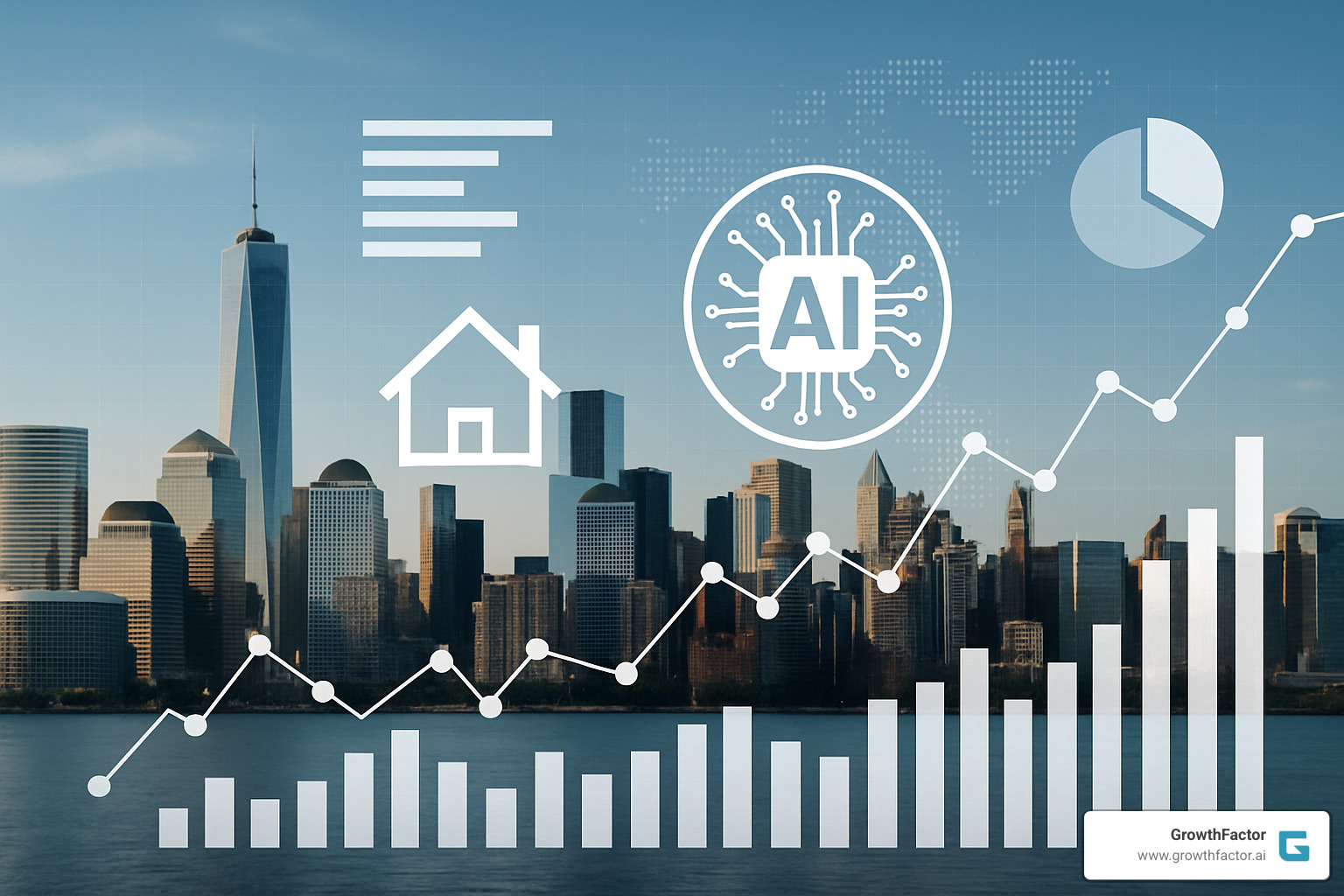
Real estate market analysis AI uses machine learning algorithms and predictive analytics to automate property valuation, forecast market trends, and assess investment risks by processing vast datasets including MLS listings, demographic data, economic indicators, and satellite imagery.
Key AI Applications in Real Estate:
- Property Valuation: Automated Valuation Models (AVMs) analyze comparable sales and market data
- Trend Forecasting: Predictive analytics identify emerging markets and price movements
- Risk Assessment: Machine learning flags potential investment risks and market anomalies
- Site Selection: AI evaluates location intelligence and demographic fit for retail expansion
- Portfolio Management: Automated lease tracking and predictive maintenance scheduling
The real estate industry is experiencing a massive technological shift. US $630 million was invested into AI-powered PropTech in 2023, while AI companies doubled their real estate footprint to 1.9 million square meters since 2020. More than 90% of C-suite leaders believe AI will fundamentally change how the workforce operates over the next five years.
Traditional real estate analysis relied on gut instinct, limited data points, and time-intensive manual processes. Today's AI-powered platforms can evaluate hundreds of properties simultaneously, process decades of market data in minutes, and provide objective insights free from human bias.
The speed advantage is remarkable. What once took real estate teams weeks to analyze - screening 800+ locations during major retailer bankruptcies like Party City - can now be completed in under 72 hours using AI-improved platforms.
I'm Clyde Christian Anderson, CEO of GrowthFactor.ai, where we've helped retail chains open up $1.6M in cash flow through faster real estate market analysis AI decisions. My background spans investment banking at Wells Fargo, private equity at BDT & MSD, and hands-on retail real estate experience, giving me insight into how AI transforms site selection and market analysis.
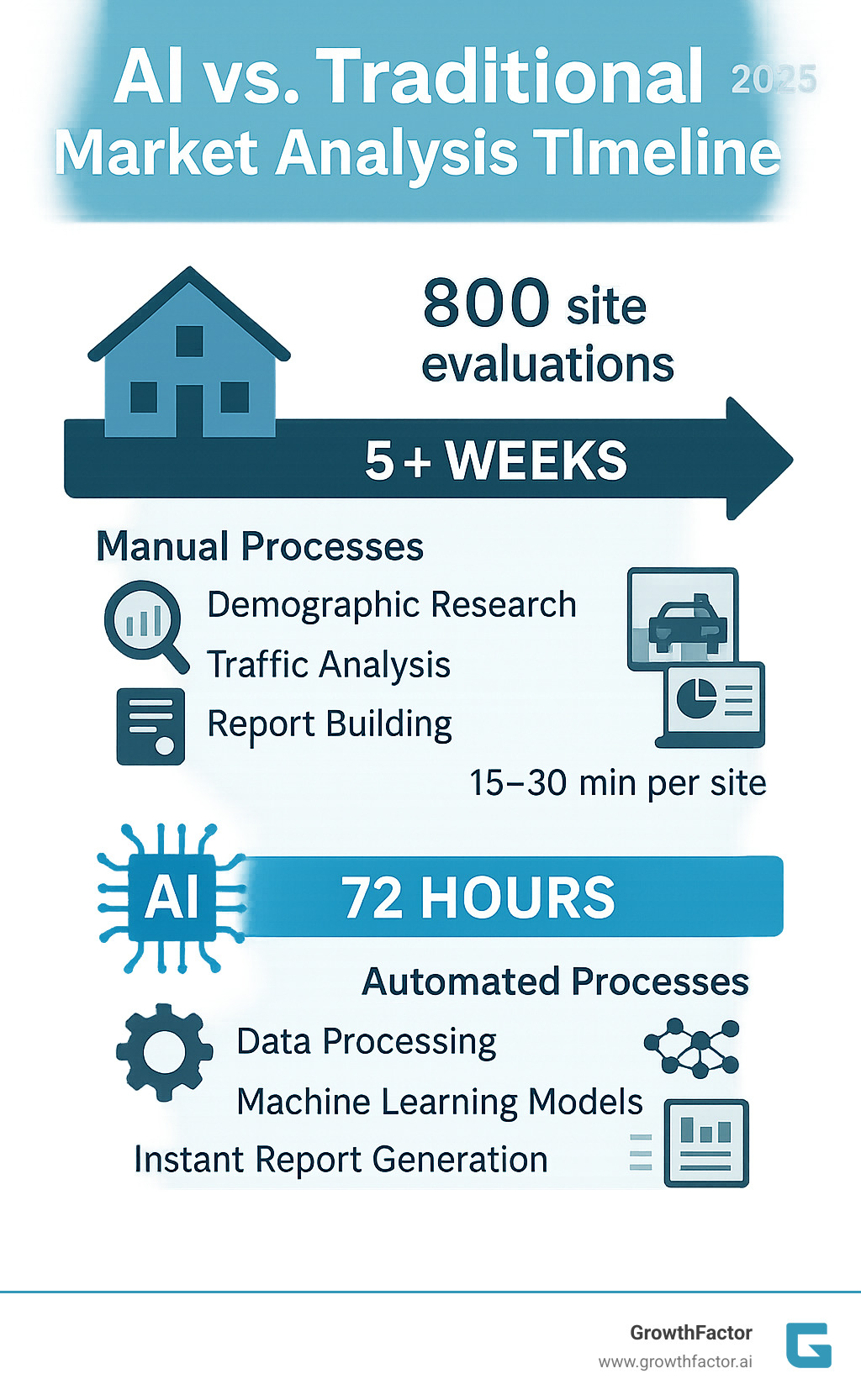
Real Estate Market Analysis AI Explained
Real estate market analysis AI combines machine learning algorithms with predictive analytics to process massive datasets. This technology represents a fundamental shift from gut feelings and educated guesses to making decisions backed by solid data.
The technology brings together several powerful tools. Predictive analytics uses historical data patterns to forecast future market conditions and property values. Automated Valuation Models (AVMs) act like digital appraisers, estimating property values by analyzing comparable sales and market trends with lightning speed.
Machine learning systems continuously get smarter by learning from new data and market outcomes. Generative AI creates new content like property descriptions and marketing materials.
What makes modern AI particularly exciting is the human-centric "co-pilot" model. Rather than replacing real estate professionals, AI improves their capabilities. It handles the number-crunching grunt work while humans focus on building relationships and making strategic decisions.
This partnership approach has actually created more jobs, not fewer. AI job postings in real estate jumped by over 250% since early 2021. Scientific research on tech-driven employment suggests AI could boost global GDP by 14% by 2030 through productivity gains.
From Gut Feel to Algorithms: The Evolution
Real estate has surfed through five major technological waves. The telegraph era enabled remote property transactions. Telephone networks accelerated deal-making. Computer systems digitized property records. Internet platforms created online property searches. Now we're riding the fifth wave - the AI revolution that automates analysis and delivers predictive insights.
Today's AI adoption follows talent clustering around tech hubs. About 37% of global AI companies call the U.S. home, with 42% concentrated in the San Francisco Bay Area.
Key Differences vs Traditional Methods
Speed represents the most obvious advantage. Traditional market analysis might take weeks to evaluate a single market. AI systems can analyze thousands of properties simultaneously, processing decades of market data in minutes.
Scale changes everything about what's possible. Human analysts hit natural limits based on time and mental capacity. AI platforms can evaluate entire metropolitan areas without breaking a sweat.
Objectivity eliminates human quirks that can skew analysis. AI algorithms provide consistent, data-driven insights that don't care about personal preferences or bad days.
Continuous learning means the system gets smarter with every transaction. While human expertise grows slowly through experience, AI models improve constantly.
Core Components of Real Estate Market Analysis AI
Data ingestion continuously collects information from multiple sources including MLS feeds, public records, economic databases, and alternative data sources like satellite imagery.
Model training is where machine learning algorithms analyze historical patterns to understand complex relationships between variables like location, demographics, and property values.
Feedback loops incorporate new market outcomes to validate predictions and improve future accuracy. When a property sells above or below the AI estimate, this information helps refine the model.
Confidence scoring provides transparency around predictions. Advanced AI systems tell you how confident they are in their answers, helping users understand the reliability of specific insights.
Under the Hood: Data, Models & Accuracy
The magic behind real estate market analysis AI is the incredible ability to digest and make sense of data that would make even the most dedicated human analyst's head spin. These systems constantly pull information from traditional sources like MLS feeds and tax assessment rolls, but also analyze IoT sensors, satellite images, and social media chatter about neighborhoods.
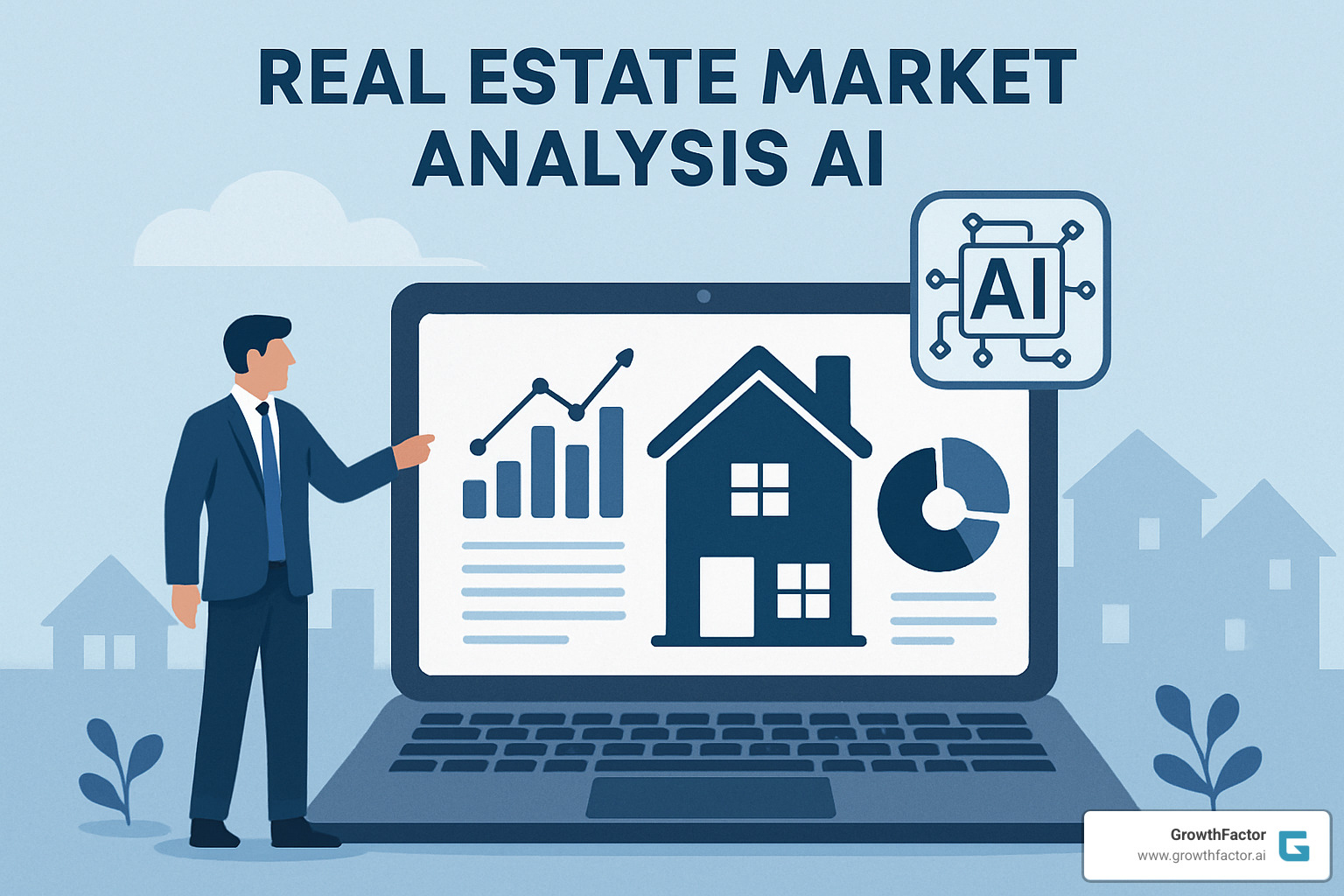
The technology has evolved from simple spreadsheet calculations to sophisticated techniques like XGBoost ensemble learning and deep neural networks that can spot patterns humans would never notice. These models can juggle hundreds of variables at once, finding connections between seemingly unrelated factors.
The proof is in the results. AI-powered tools like Smartzip successfully predicted 72% of listings last year, beating traditional forecasting methods by a wide margin. Smart systems continuously check their work against real-world outcomes.
Data Inputs That Power Predictions
Real estate market analysis AI considers economic indicators like job growth and wage trends, demographic shifts, and permit filings that signal upcoming development. Some of the most valuable insights come from unexpected places.
Mobile phone data reveals actual foot traffic patterns around retail properties. Credit card transactions show spending patterns that directly impact retail real estate performance. More info about Real Estate Data Intelligence explains how combining traditional and alternative data sources creates competitive advantages.
Satellite imagery can spot construction activity months before permits show up in public records. Social media sentiment analysis gauges what people really think about different neighborhoods. Even weather patterns matter for construction timelines and retail foot traffic.
Poor data quality costs the U.S. economy around $3.1 trillion per year, which is why data governance is absolutely critical for AI success.
Predictive Models & Automated Valuations
Automated Valuation Models (AVMs) have moved far beyond simple comparable sales analysis. They now consider hyperlocal factors like school quality, crime rates, walkability scores, and proximity to amenities.
Modern real estate market analysis AI systems can run "what if" scenarios that would take human analysts weeks to calculate. What happens to property values if interest rates jump 2%? How would a major employer leaving town affect the local market?
Price forecasting models use time series analysis to predict future market conditions. Risk assessment algorithms act like early warning systems, flagging properties that are priced significantly above or below market value.
AI vs Human Experts: Who's More Accurate?
The accuracy battle between AI and human experts varies by situation. For routine property valuations in busy markets with lots of data, AI often beats human appraisers in both speed and accuracy.
| Metric | AI Systems | Human Experts |
|---|---|---|
| Speed | Minutes to hours | Days to weeks |
| Consistency | High (no bad days) | Variable |
| Data Processing | Unlimited scale | Limited capacity |
| Cost | Low marginal cost | High labor cost |
| Nuanced Judgment | Limited | Superior |
AI systems never get tired and never let personal bias creep into analysis. Human experts excel at understanding unique situations and making judgment calls about factors that don't show up in databases.
The winning combination uses AI for heavy lifting and humans for strategic thinking. Real estate market analysis AI handles data processing while humans focus on interpretation and relationship building.
High-Impact Use Cases & Case Studies
When you're trying to understand the real power of real estate market analysis AI, nothing beats seeing it in action. The results are impressive.
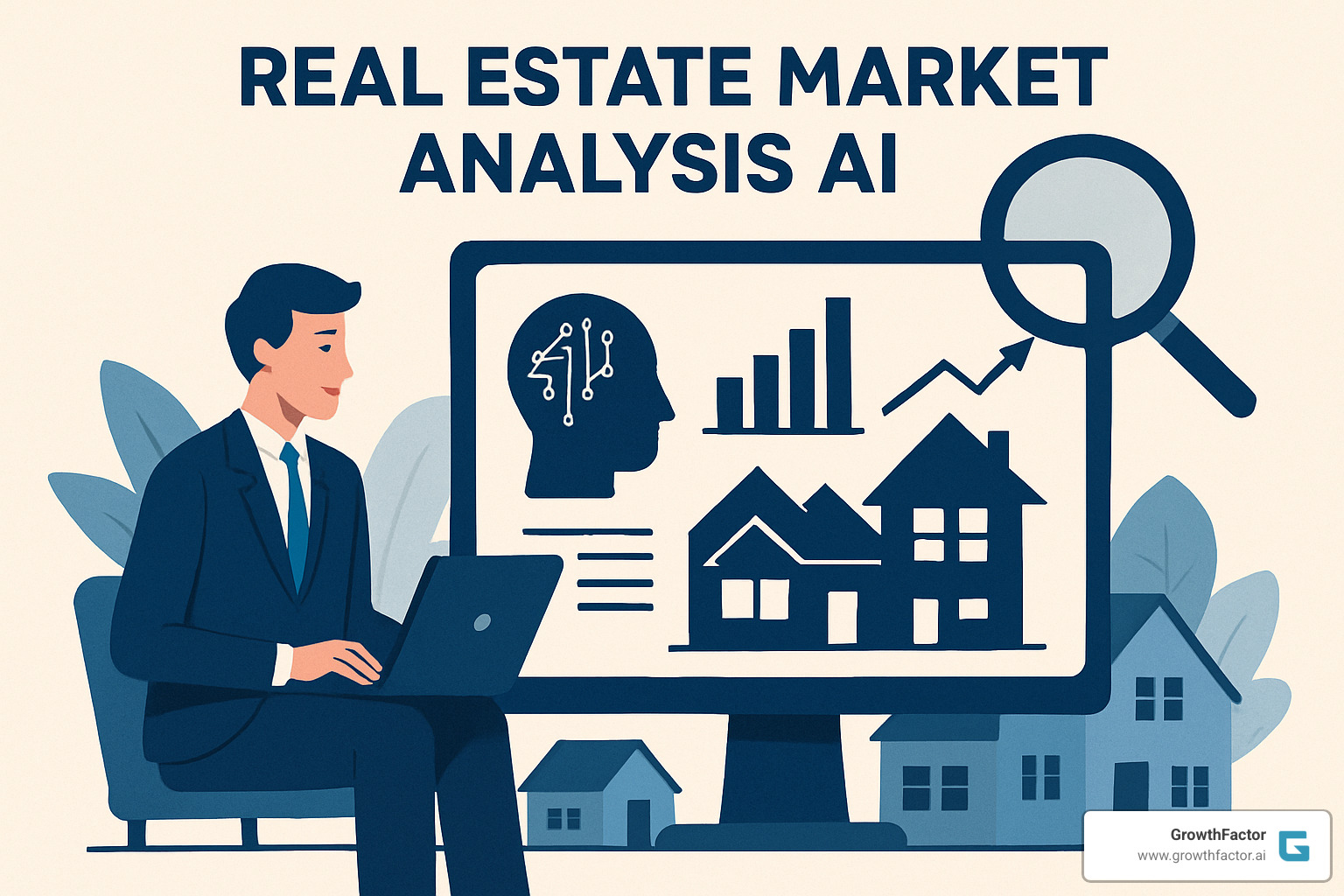
Royal London Asset Management achieved a 708% ROI and 59% energy savings in an 11,600 square meter office building using AI-powered energy optimization. The AI system learned when people actually used the building and adjusted heating and cooling automatically.
Virtual tours powered by AI have cut in-person viewing needs by 30%. When major retailers hit financial trouble, traditional site selection can take months. Real estate market analysis AI platforms can screen hundreds of locations in just days, turning market disruption into opportunity.
Predictive maintenance using AI systems and sensor data helps predict problems before they happen. Property managers are seeing operational cost reductions of 10-15% from smarter maintenance scheduling.
Property Valuation & Pricing Engine
Property valuation is where AI really shines. Modern systems don't just look at comparable sales - they dig deeper into factors that traditional appraisals might miss entirely.
Hyperlocal analysis considers everything from traffic patterns to air quality. Machine learning algorithms figure out what actually matters for property values, not what we think should matter.
The challenge with automated valuations is handling unique properties or rapidly changing markets. This is why confidence scoring has become important. The AI tells you "I'm 85% confident about this estimate" or "This property is unusual - you should get a human to take a look."
Advanced valuation engines now look forward, considering planned infrastructure projects, zoning changes, and demographic trends that will affect future values.
Market Trend Forecasting & Risk Flags
Predictive analytics excel at spotting trends before they become obvious. Smartzip's platform predicted 72% of listings last year by analyzing homeowner behavior patterns, property characteristics, and market conditions.
Scenario simulation lets you test assumptions against reality. What happens to rental income if unemployment jumps 3%? AI systems can run thousands of scenarios to stress-test investment plans.
Risk flagging systems work like early warning systems, monitoring multiple indicators simultaneously and alerting you when something needs human attention.
Generative AI for Visualization & Client Engagement
Generative AI is opening up exciting possibilities for property visualization. Virtual staging systems can transform empty properties into beautifully furnished showrooms in minutes, saving thousands in physical staging costs.
3D digital twins created from drone imagery let people explore properties remotely. Interactive floor plans powered by computer vision help clients understand how spaces actually work.
Scientific research on tech anxieties shows that AI tools actually make human professionals more capable rather than replacing them entirely.
Implementation, ROI, Challenges & Future Outlook
Successfully implementing real estate market analysis AI requires careful planning, quality data infrastructure, and clear governance frameworks. Organizations must balance potential returns with integration challenges, data quality, and regulatory compliance.
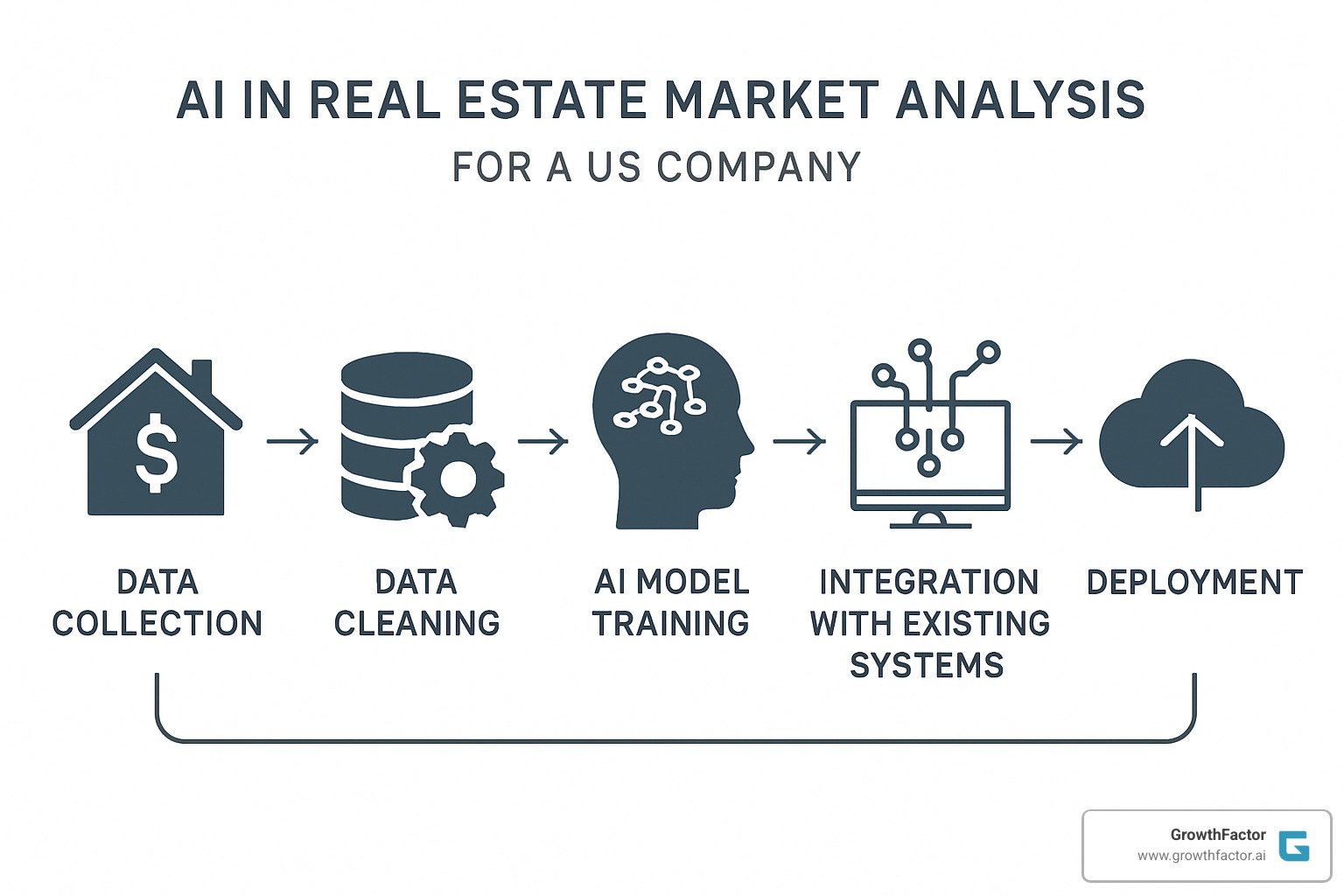
Data quality forms the foundation of effective AI implementation. Organizations must invest in data cleaning, standardization, and governance before expecting reliable AI insights. Modern tech stacks often center around platforms like Snowflake for data warehousing.
Integration challenges vary by organization size and existing technology infrastructure. At GrowthFactor, our AI Agent Waldo demonstrates how AI can be embedded into existing workflows without requiring massive infrastructure investments.
More info about AI for Real Estate provides detailed guidance on implementation strategies and best practices.
Integrating Real Estate Market Analysis AI Workflows
Successful AI integration requires seamless connection with existing business processes. CRM synchronization ensures that AI insights flow directly into sales and leasing workflows, eliminating manual data transfer.
Site selection automation represents a particularly high-value application. Instead of manually screening hundreds of potential locations, AI systems can automatically rank opportunities based on predefined criteria.
API strategies enable integration with multiple data sources and business systems. The key is starting with high-impact, low-risk applications before expanding to more complex use cases.
Measuring ROI & Accuracy Uplift
Quantifying AI returns requires tracking multiple metrics beyond simple cost savings. Deal velocity improvements - how much faster teams can evaluate opportunities - often provide the largest returns.
Energy cost reductions from AI-optimized building systems provide measurable savings. KPI dashboards should track both leading indicators (properties analyzed per week) and lagging indicators (actual investment returns, occupancy rates).
Ethical, Privacy & Regulatory Guardrails
AI implementation in real estate must steer complex ethical and regulatory considerations. Data privacy regulations like GDPR and emerging AI governance frameworks require careful attention to data collection and algorithmic decision-making.
The AI Bill of Rights emphasizes transparency and human oversight in automated decision-making. Bias mitigation requires ongoing attention through regular algorithmic audits and diverse training data.
What's Next: 3-5 Year Outlook
The future of real estate market analysis AI points toward increasingly sophisticated systems. "Real intelligent buildings" will emerge as a new asset class, with AI-compliant infrastructure becoming the default.
Edge data centers will proliferate to support real-time AI processing. Generative design AI will transform property development by automatically creating optimized floor plans and building designs. The integration of IoT sensors with AI analytics will create comprehensive building intelligence systems.
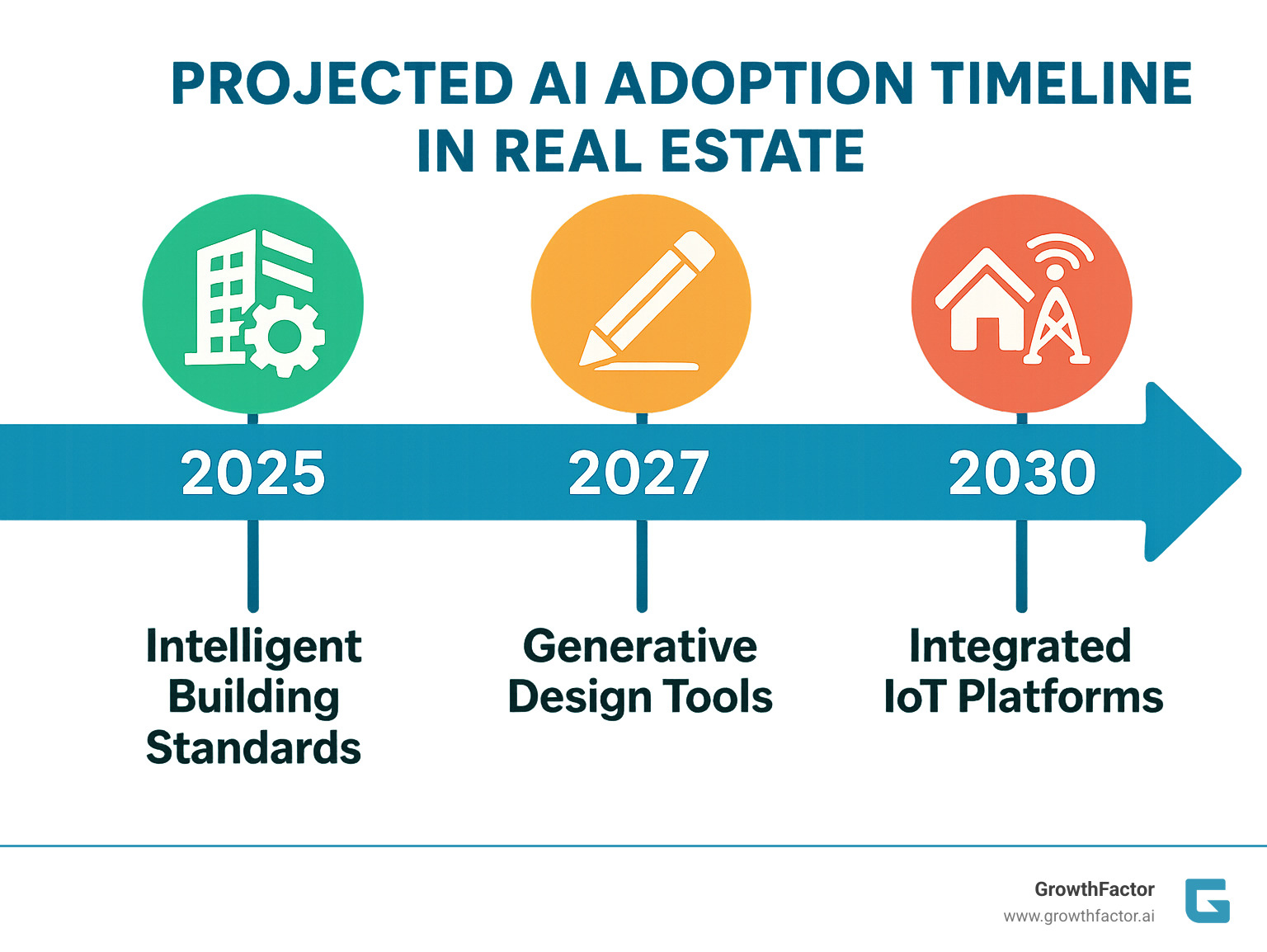
Frequently Asked Questions about Real Estate Market Analysis AI
How accurate are AI-powered tools compared to seasoned analysts?
For routine property valuations in markets with plenty of data, real estate market analysis AI often matches or beats human accuracy while delivering results in minutes instead of days.
Seasoned analysts still have the edge when dealing with unique properties or situations that require reading between the lines. The magic happens when you combine both approaches - AI handles processing thousands of data points while human experts focus on strategic interpretation.
Smart organizations regularly check their AI predictions against actual market outcomes to ensure accuracy doesn't drift as market conditions evolve.
What data does real estate market analysis AI actually use?
The breadth of data feeding modern AI systems includes obvious sources like MLS listings, tax records, and comparable sales data, but real estate market analysis AI goes much deeper.
Satellite imagery reveals construction activity months before official records. IoT sensors provide real-time occupancy patterns. Social media sentiment analysis gauges how people feel about different areas. Foot traffic data from mobile devices shows actual usage patterns around retail properties.
The real challenge isn't finding data - it's ensuring quality and relevance. Poor data quality costs the U.S. economy around $3.1 trillion annually, which is why successful AI implementations invest heavily in data validation processes.
How can small brokerages start without huge budgets?
Most AI platforms now offer subscription-based pricing starting in the hundreds rather than thousands of dollars monthly. Cloud-based systems eliminate the need for expensive hardware or technical staff.
The smart approach is starting with high-impact applications like property valuation and basic market analysis that provide immediate value without requiring complex integrations.
At GrowthFactor, our Core plan starts at $500 monthly, making AI-powered site selection accessible to smaller teams. Focus on proving value before expanding scope - once you see how AI speeds up analysis, it becomes easier to justify investing in more advanced features.
Conclusion
The change happening in real estate isn't just about fancy new technology - it's about fundamentally changing how we make smarter property decisions. Real estate market analysis AI has moved from experimental to essential, with $630 million flowing into AI-powered PropTech in 2023 alone.
The numbers tell a compelling story. Organizations using AI-optimized building systems are seeing 708% ROI and 59% energy savings. Teams that once spent weeks analyzing hundreds of sites can now complete the same work in 72 hours.
The winners aren't replacing human expertise with algorithms. They're combining AI efficiency with human judgment in ways that make both more powerful. AI handles the heavy lifting while human experts focus on interpreting complex situations, building relationships, and making strategic decisions.
The path forward is straightforward. Start with high-impact applications like property valuation where benefits are immediate and measurable. Ensure your data quality is solid. Then gradually expand to more sophisticated use cases as your team builds confidence.
At GrowthFactor, we've seen this change firsthand. Our AI Agent Waldo helps teams evaluate five times more sites efficiently, turning overwhelming site selection processes into manageable, data-driven decisions. With plans starting at $500 monthly for our Core package, the technology is now accessible to organizations of all sizes.
Ethical considerations matter too. As AI becomes more powerful, maintaining transparency, avoiding bias, and keeping humans in the loop for critical decisions builds trust and ensures compliance with emerging regulations.
Looking ahead, we're moving toward "real intelligent buildings," generative design AI, and edge computing that brings real-time insights directly to properties. The organizations positioning themselves now will capture these opportunities.
The choice isn't whether AI will transform real estate - it already has. The choice is whether you'll lead that change or scramble to catch up. Whether you're evaluating a single property or managing a national portfolio, real estate market analysis AI provides the speed, scale, and objectivity needed to compete in today's market.
Ready to see how AI can transform your site selection process? More info about Data-Driven Site Selection shows you exactly how to implement AI-powered strategies that deliver measurable results.
The crystal ball isn't magic - it's machine learning, and it's waiting for you to pick it up.
Citations
The human algorithm
Request Your demo
Schedule meeting
Or submit your information below and we'll be in touch to schedule.


